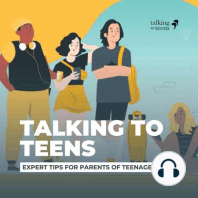18 min listen

Ep 65: 'Punishment' is a Trick Tactic
Ep 65: 'Punishment' is a Trick Tactic
ratings:
Length:
27 minutes
Released:
Dec 29, 2019
Format:
Podcast episode
Description
Click for full show notes, exercises, and parenting scripts from this episodeDo you ever find that the more you try to communicate with your teens, the less they listen? You have to remind them to do their chores, to make good choices, to make it home on time and in one piece, but the lessons don’t sink in even when there are serious consequences for bad behavior. It makes it seem impossible to break through to them! But the solution may be taking a less punitive approach, and instead focusing on fostering the best relationship possible.This week, we had the pleasure of sitting down with Dr. Laura Markham, author, parenting expert, and researcher who centers her advice around building relationships. Dr. Markham earned her Ph.D. in clinical psychology from Columbia University. Her website, ahaparenting.com, started off small but over the years has grown into an extensive parenting resource.We went over some of the key points from her books, Peaceful Parent, Happy Kids and Peaceful Parent, Happy Sibling, where she writes about the hardest job in the world: parenting. In her words, “What could be more high stakes than raising another human being?”Her goal is to give parents a comprehensive plan, while helping them understand that parenting is not a set of strategies, it’s a relationship.One way to support your relationship with your teen is to think of alternatives to typical punitive punishments. If you look at the research, punishments rarely seem to have the intended effect of behavior change. Teens instead just get better at hiding the behavior you disapprove of. Instead of being more honest, teens just get better at lying. In relationships based upon mutual respect, Dr. Markham argues that there is no reason to punish. Instead, parents and teens can work together to decide on any consequences and a new plan of action for mistakes.Rather than punishing your teen for a poor grade in a class by taking away their phone, Dr. Markham suggests sitting down with your teen, and asking how they got to the poor grade. Then the next step would be to come up with a plan together about what your teen will do get their grade back up and repair the relationship. "No punishments" doesn't mean teens get off scot-free for bad behavior - there are still consequences.Back Away from YellingAnother technique for improving a relationship comes down to communication skills. Yelling matches aren't fun for anyone. The fast you can interrupt them, the better your relationship will be. Dr. Markham stresses the ‘Stop, Drop, and Breathe’ method. Stop what you’re doing, drop your agenda, and take a deep breath. When you’re frustrated and your teen yells at you, instead of escalating, it might be better to try and see your teen’s perspective.This is where limits come in. If your teen surpasses a clearly established limit, such as swearing at you during a fight, you need to check them on that. Tell them it’s okay to be mad, but you won’t be having a conversation with them until they cool down and are ready to talk with respect. Respect is a paramount rule, and there’s certainly a limit where behavior is no longer considered respectful.We also think it’s good to come up with alternatives to speech that might degrade the relationship, such as, “I told you so”, “you’re lying”, or “you messed up.” We want to support our teens even when they test our limits, so we suggest saying something along the lines of, “your promise didn’t come through and that hurts our relationship, so let’s come up with a plan to fix it.”A lot of our conversation with Dr. Markham focuses on what parents can do to work on themselves and regulate their own emotions. After all, a teen is way more likely to yell and act out if they don’t feel like their parent listens to them, or if they see their parents act out and adopt a similar behavior.One of our biggest takeaway tips from this interview is that parents need to check in and make sure that their child is feeling heard. Part of that invo
Released:
Dec 29, 2019
Format:
Podcast episode
Titles in the series (100)
Ep 1: Success and Getting What You Want in Life: Bill Deresiewicz, bestselling author of Excellent Sheep, talks about the conversations he had with students that really had an impact when he was teaching at Yale and Columbia. His advice for how to do this with your own teen involves being non-judgmental by Talking To Teens: Expert Tips for Parenting Teenagers